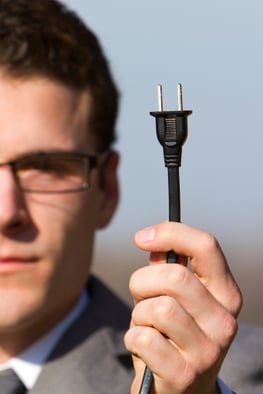Electrical Safety Tips in the Workplace
[fa icon="calendar"] September 30, 2014 / by Home Services Expert
 It just might be the easiest place in the world to let your guard down about electrical safety, and that place is your workplace.
It just might be the easiest place in the world to let your guard down about electrical safety, and that place is your workplace.
After all, when you're at home, you're in charge (or at least partially so). At work, someone in your maintenance or safety division probably has jurisdiction over safety issues, so it's easy to get complacent and assume everything is in good working order and poses no personal safety hazard.
Don't Let Your Guard Down at Work
Unfortunately, it's precisely when we let our guard down that accidents often occur. In fact, the Electrical Safety Foundation International estimates that electrical hazards cause more than 300 deaths each year, which equates to nearly one fatality every day. This stunning statistic makes electrical accidents the sixth-leading cause of work-related deaths in the United States.
Meanwhile, about 4,000 electrical injuries occur in the workplace each year, resulting in an average of 13 days of recuperation time.
Take the Right Precautions at Work
Clearly, electrical safety is nothing to take for granted in the workplace, even if you regularly do no more than plug in the coffee maker or have to rearrange extension cords to make room for a new laptop cord. So keep your guard up and, to some extent, exercise some of the same safety practices you do at home. Still, you might have to be a bit more vigilant about what you're wearing, since most of us dress up more for work than we do while we're relaxing at home. For example:
- Refrain from wearing metal jewelry that might come into contact with electrical current.
- Wear eye protection – such as plastic eye goggles – where required.
- Put on rubber-soled shoes or boots on damp or wet surfaces – a safety precaution that will protect you from tripping and falling, too.
- Wear safety-approved rubber and leather gloves if and when you come into contact with electricity. But as always, proceed only if you're confident about what you're doing. Failing that, contact your maintenance or building supervisor.
Then take careful stock of your surroundings and:
- Check for spills, dampness or pooling water around or near electrical equipment. Be mindful of windows left open overnight following a downpour.
- Inspect cords and extension cords before using them. They should be in good condition – free of fraying or loose wires.
- Ensure that connections and ground wires are tight and free from splits or breaks. It bears repeating: If you're in doubt about the wisdom of using an electrical device, or you come into contact with defective tools or electrical equipment, immediately contact your maintenance or building supervisor. Always put electrical safety first – not expediency.
Actually, this is practical advice if you find yourself going “above and beyond” your normal work duties, too. In this case, be sure to heed proper electrical safety procedures and:
- Ensure that you are properly trained for the task at hand.
- Understand and heed your company's safety protocols. Refer to the proper procedures, documents or diagrams.
- Use the proper tools, and inspect them carefully to ensure they are in decent shape before proceeding.
- Identify all possible energy sources that could pose an electrical hazard.
- Never assume that equipment is de-energized. Always test before you touch.
Obviously, there's a lot more to electrical safety in the workplace than meets the eye. If you wish to educate yourself further on the topic, refer to an all-inclusive electrical safety guide produced by the Occupational Safety and Health Administration. And never hesitate to contact Experts In Your Home in Chico. Think of us as your best electrical safety advocate at home and in the workplace, too.
To learn more about electrical safety, download the free ebook below.



